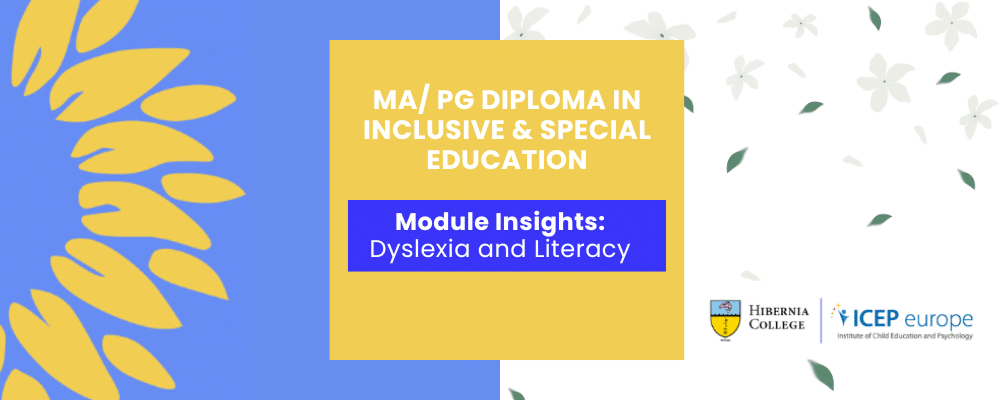Dyslexia is a common learning difficulty that affects a significant number of students across all educational levels. This module aims to expand the knowledge, understanding, and skills of educators in support of learners with dyslexia. The module provides an in-depth examination of dyslexia theory and current research; it examines the neurological origins of dyslexia and provides practical information about screening, identification, prevention and early intervention for reading and literacy difficulties. A collaborative, whole-school approach is central to working effectively with both parents and learners; therefore, this module focuses on the factors essential for the inclusion, support and effective education of learners with dyslexia. Evidence-based strategies for teaching and learning literacy skills and supporting learners in specific subjects are examined, and the module also reviews effective intervention and remediation programmes. The module offers the opportunity to gain evidence-based strategies and skills for detecting and responding to the needs of students with learning difficulties arising from dyslexia in the context of inclusive practice.
Insights from Lead Tutor: Therese Mc Phillips

Module Lead on Dyslexia & Literacy, MA in Inclusive and Special Education
Therese Mc Phillips, the lead tutor for the Dyslexia and Literacy module, emphasises the importance of understanding dyslexia from an inclusive perspective. She explains that at least 10% of primary and post-primary students in each class, will have dyslexia. The Module Dyslexia and Literacy supports practitioners in addressing the challenges faced by individual students with literacy difficulties and dyslexia. By exploring the process of reading development and the underlying causes and indicators of dyslexia, practitioners will develop a ‘dyslexia radar’ by closely observing students who struggle with the development of literacy skills and may have dyslexia.
Drawing from the principles of UDL, and an inclusive perspective, the Dyslexia and Literacy module supports teachers to move beyond the dyslexia label and expand their teaching strategies to support reading accuracy, fluency, and comprehension; spelling; handwriting and writing. We also consider how to translate a ‘dyslexia friendly’ policy into practice with a focus on the differentiation of curriculum, instruction, and assessment. Students who choose to study this module build up their personal and professional experience through the learning activities and discussion and the live online sessions.
Student Experience: Caroline McNamara (Post-Primary Education)
Caroline McNamara completed the Dyslexia and Literacy module as the final part of her postgraduate diploma. Here’s more about her experience of studying the module:
It was fairly challenging but rewarding in that it has made me more aware of the possible causes of dyslexia, its prevalence and the challenges faced by learners with dyslexia. In a way, it has normalised it, made it seem more manageable within the general classroom setting, shown me that there are evidence-based interventions that make the day better for the dyslexic student and are helpful also to their peers. I have also learned about specific interventions for dyslexic students and I know where to access these and how to keep up to date with new developments in the area for the benefit of students. The units of the module were well delineated and the tutor was very approachable and helpful.
Student Experience: Sharon Grady (Primary Education)
For Sharon Grady, studying the Dyslexia and Literacy module was an enriching experience that significantly contributed to her professional growth in the primary school sector. According to Sharon:
The module struck an ideal balance between theoretical concepts and practical applications, providing a comprehensive understanding of dyslexia and its implications in educational settings.
One of the key aspects of the module for me was the up-to-date research shared throughout the course. This ensured that we were equipped with the latest knowledge and insights into dyslexia, allowing us to grasp its complexities and nuances effectively. Therese’s wealth of experience and expertise was invaluable. Her guidance and support not only facilitated a deeper understanding of the subject matter but also encouraged critical thinking and exploration of practical solutions. Therese provided great support for the assignment without letting it overshadow the crucial learnings of the module, maintaining a well-balanced approach throughout.
The lectures were informative and engaging, fostering an interactive learning environment where ideas could be exchanged and discussed freely. This dynamic and interactive approach helped solidify my understanding of dyslexia and its impact on individuals in the primary sector.
The knowledge gained from this module has had a tangible impact on my role within our primary school. It has equipped me with the tools and strategies needed to recognise and support individuals with dyslexia effectively. By understanding the diverse needs of students with dyslexia, I am better equipped to create inclusive learning environments that cater to their specific requirements. This has not only enhanced my ability to meet the needs of all students but has also contributed to a more supportive and inclusive educational experience for everyone involved. I feel very confident discussing dyslexia and strategies to support dyslexic pupils with my colleagues. We are planning on creating a standalone policy on dyslexia. Previously, it was integrated into our broader Special Educational Needs (SEN) policy. I find this very exciting and I am delighted to now be able to fully participate in this initiative within our school.
Conclusion
The Dyslexia and Literacy module offers invaluable insights and practical strategies for educators seeking to support students with dyslexia, which makes it a pivotal component of the Masters/Postgraduate Diploma in Inclusive and Special Education programme. Through the experiences shared by Caroline and Sharon, it’s evident that this module equips teachers with the knowledge and confidence to make a positive impact in their classrooms. By understanding dyslexia and implementing effective interventions, educators can create a more inclusive and supportive educational experience for all students.
If you’re interested in learning more about how this module can benefit your teaching practice, consider enrolling in the programme. With the right tools and strategies, you can help all your students, including those with dyslexia, achieve their full potential.
Interested in applying for our next intake? Start your application now!



